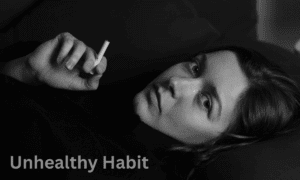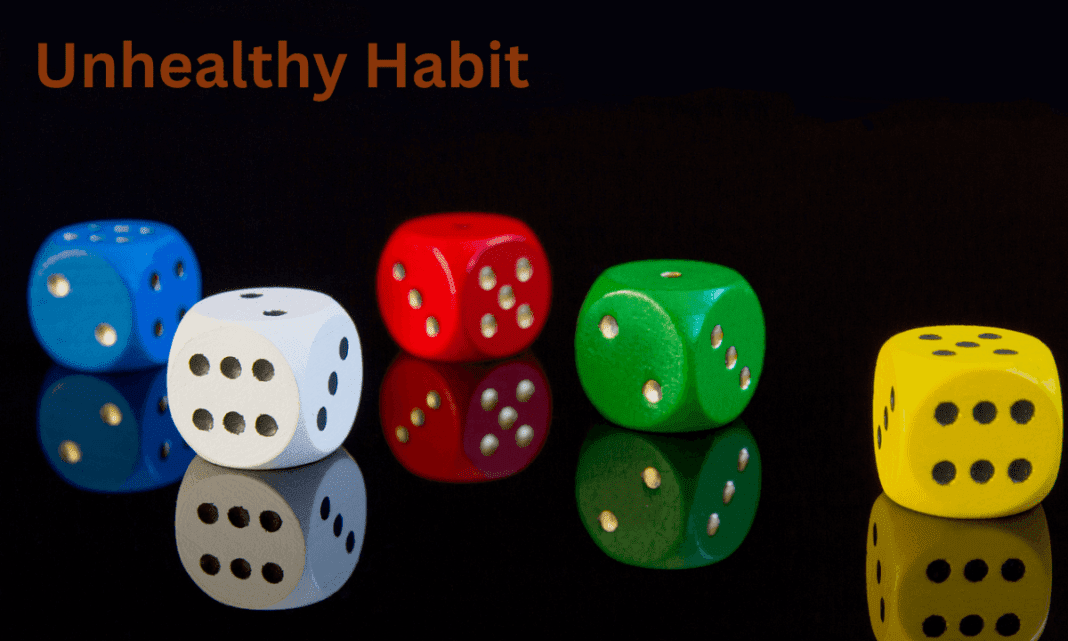To Break Unhealthy Habit: Forget About Relying on Your Willpower

However, an unhealthy habit is a behavior pattern that harms one’s physical and mental health and has unfavorable outcomes. Some examples of bad habits include eating too much, not getting enough exercise, and drinking too much.
Exactly What is an Unhealthy Habit?
According to the Medical Dictionary, an unhealthy habit is “a patterned behavior regarded as detrimental to physical or mental health.” Unattended, these patterns of conduct can escalate into a major problem. That is why tackling them where they originate before they grow is critical.
Any behavior we engage in regularly to the point where it becomes nearly automatic is considered a habit. We can say that this tendency is a “bad habit” if it starts to make us feel bad.
According to an online dictionary, aunhealthy habit is “a pattern of behavior seen as harmful to one’s physical or mental health, which is often associated with a lack of self-control.” In its most basic form, a bad habit is any repetitive behavior that you engage in for short-term pleasure but frequently harms you in the long run.
For example, I used to indulge in internet shopping as a stress reliever in graduate school. I could avoid issues with my credit card payments at first, but eventually, it grew routine and became a major problem. Shopping as a kind of therapy is one of my vices, but I was fortunate enough to obtain it before I went into serious debt.
Shrinking Brain: These 5 Idiotic Daily Practices Cause Brain Atrophy Quickly.
How Do Addictions and Habits Connect?
Addiction is a serious disease, and bad habits are a less severe but nonetheless necessary precursor. To avoid relapsing, you must treat your harmful habits with the seriousness they deserve.
If you want to keep addiction from taking over your life, the next step is to break bad habits. When you look at your bad habits in this light, you’ll see how important it is to change your pattern of behavior.
Another benefit of recognizing the link between an addiction and a habit is that it motivates us to take the required actions to break the habit while we’re sober.
Methods for Conquering Any Habit or Addiction
It might be challenging to embrace a necessary change, similar to addiction. A pattern of conduct, once formed, becomes impulsive and, more often than not, goes unnoticed by the individual. We revert to our old ways of behaving because of these destructive patterns.
Positive Routines vs. Negative Patterns


The formation of habits reduces the amount of mental effort required. We establish a link between the event, our actions, and the reward, but we don’t always link these to the outcomes in the future. For instance, once you start smoking, you’ll likely keep doing it since you know it makes you feel better when you’re stressed.
While engaging in such harmful behaviors could provide short-term gratification, they ultimately lead to detrimental effects on one’s physical, emotional, and mental health.
Some telltale signs of harmful habits are:
- Potentially distressing or guilt-inducing
- It could make you drowsy or worsen your health in other ways.
- Conversely, beneficial behaviors yield results in the long run. For example, it is well-established that regular exercise, such as going for a walk first thing in the morning, can positively affect cardiovascular health, mood, and mental wellness (Mandolesi et al., 2018).
- Good habits are characterized by things like:
- Establishing a regimen that fosters wellness
- It boosts confidence and involves self-care.
Unhealthy Habit Patterns
Some of the worst things that people do regularly are listed here.
- Tobacco use. Scientific studies have shown that even a single cigarette has negative health effects (Jha, 2020). Twenty minutes after your final cigarette, you’ll start to feel the effects of quitting (Jha, 2020).
- Not working out. Compared to smoking, this is a far more subtle yet no less harmful habit. However, inaction can also be a terrible habit. Regular exercise will greatly benefit your physical and mental well-being (Mandolesi et al., 2018). If you want to get in at least thirty minutes of exercise daily, breaking it up into smaller portions, like fifteen minutes first thing in the morning and fifteen minutes after work, can be useful.
- Insufficient sleep. Everyone needs to sleep every night. Lack of sleep has a deep relation with increasing developing hypertension. Diabetes, obesity, depression, cardiovascular disease, and stroke, according to research (Colten et al., 2006). If you’re an adult, plan your day around getting 7 or 8 hours of sleep. Consult your physician if you find it difficult to wind down at the end of the day.
- Excessive screen usage in the hours leading up to bedtime. Quitting the practice of staring at a device an hour or two before bedtime will help you obtain a better night’s rest. The light emitted by electronic devices like smartphones, tablets, and televisions may interfere with the hormones that help us fall asleep (Gringras et al., 2015). Meditation in the present moment or doing something relaxing, like reading, before night might be more helpful.
- Being slouched. We often sit at desks or in front of computers for work. Over time, slouching or hunching can cause discomfort in the lower back (Alamin et al., 2018). Taking a few moments to stand up and move around your desk occasionally or working on your posture might be helpful.
- Being wasteful with money. Buying unnecessary items is a common coping mechanism for those under stress. Making a budget or arranging to check your accounts frequently can help you avoid getting into debt, which is something that can quickly happen if left unchecked.
- Delaying important tasks. Everyone does it; we need more time to accomplish everything on our to-do lists. The two most common reasons people put things off until later are being overly meticulous or lazy. Sticking to a timetable could help get things done on time.
- Negative Internal Dialogue. People have a terrible time complimenting themselves. Our culture instills in us the habit of being the harshest judge of ourselves, which can negatively impact our confidence. Engaging in positive self-talk can be beneficial. By encouraging yourself, you can help yourself see the positive side of things and feel better.
How to Be Great? What Does it Take to Achieve Greatness and Become a Great Person?
Break Unhealthy Habit


If you want to stop bad habits and start doing good ones, you need to figure out where they come from and do something about it.
Most Americans begin their day with coffee, whether a traditional drip brew, an espresso shot, or a morning latte.
The idea that coffee helps us wake up and fight off lethargy is popular among regular coffee consumers.
However, that account could be more credible. The caffeine content of coffee, after all, can differ greatly from one cup to the next. Caffeine concentrations can increase by a factor of two across different beverages served at the same coffee shop, even when ordered identically. But those of us who drink coffee don’t appear to care.
What else could be motivating us to seek out that morning coffee?
Our new research aimed to address that very topic. The answer greatly affects how we tackle big societal problems like nutrition and climate change.
As behavioral scientists, we know that habituation is a powerful force that causes people to repeat mundane actions. Not being exhausted is probably the only reason you instinctively reach for coffee when you’re a frequent drinker.
But habit doesn’t seem like a satisfactory explanation; it’s disheartening to think that our actions are merely a result of our habitual patterns. We come up with more convincing reasons, like drinking coffee to clear our head first thing in the morning.
Because of this hesitancy, we often go about our lives unconsciously, repeating the same routines.
Deconstructing the Root Causes of Routines
We polled over a hundred coffee drinkers to see if the habit should be more appreciated. Regarding what motivates individuals to consume coffee, they ranked fatigue nearly as essential as habit. We monitored their coffee consumption and levels of exhaustion for a week to see how these predictions stacked against reality.
Our study participants’ explanations and the actual results were very different. While it’s hardly surprising that they drank more coffee when exhausted, the habit was just as powerful of an influence. Put simply, individuals greatly exaggerated fatigue’s significance while grossly underestimating habit’s power. Habits are thought of as providing little explanation.
In a second study, we used a practice that individuals could think of as “bad”—not helping when asked for assistance—and we could reproduce this conclusion. Still, many failed to consider routine, reasoning that their unwillingness to offer assistance merely reflected their emotional state.
The discrepancy between the real and imagined function of habit is significant. This chasm is fundamental to comprehending why individuals frequently find it difficult to alter habitual actions.
One strategy to cut back on coffee consumption could be to get a better night’s sleep if you think you drink it to combat fatigue. However, in the end, you would be pointing fingers in the wrong place because your habit would still be present when you wake up.
Why it’s so Damn Hard to Break a Habit


Because habits aren’t always completely under our control, breaking them can be a real challenge. Sure, most of us can control one habit at a time, like this time I’m going to pass on the coffee, or this time I’m going to help a lost tourist find their way. Through sheer force of will, we persevere. But it’s quite challenging to control a habit continuously.
For the next five seconds, try not to speak anything that starts with the letter “I”; that should help. It’s not too complicated, is it? Now, think about how difficult it would be to stick to this guideline for a week. Words that contain “I” are common in our vocabulary. This once-easy chore becomes rather daunting when you consider the necessity of constant monitoring.
We make the same mistake when we break bad habits and start good ones. Think about your excitement when beginning a new exercise or diet program; most of us can accomplish this soon.
But eventually, we become weary, preoccupied, and focused. In such a case, you’ll find yourself right back where you were before—guided by your previous habit. Better techniques that target habits effectively will continue to slip your mind unless you acknowledge the importance of habit.
We fail to appreciate the merits of our positive behaviors, which is the inverse of what we should do. According to one study, people with weak exercise habits and high intentions to exercise got the same amount of physical activity on days they firmly planned to exercise.
On the other hand, those with strong habits were more active on days when their intents were less. So, even though intentions come and go, powerful habits keep behavior on course.
Top 10 Mental Health Organizations in the United States
Motive is Only One of the Factors.
Part of the blame for the propensity to ignore routines lies with American culture. People in the United States are more inclined to believe that they have some say over their level of achievement in life than people in other industrialized countries.
As a result, Americans often say they lack the self-control necessary to adjust their lifestyle positively. Having the self-control to do things like joining a gym or beginning a diet is helpful in the short term, but eventually, our enthusiasm wanes.
However, contrary to popular belief, those who are better at reaching their long-term objectives use less self-control daily. As we’ve seen, willpower wanes, and habits take over with time. So, it’s no surprise that this happens.
What, then, is the secret to habit management if self-control isn’t it?
The surroundings that encourage habit change are crucial. Studies have shown remarkable success can be achieved by capitalizing on the signals that initially set off behaviors. For instance, cigarette sales have dropped since cigarette packs are less prominently displayed in stores.
Creating friction is another strategy for changing behaviors, making it harder to engage in bad habits while making good ones easy to do. For example, a study indicated that recycling rates were higher when bins were positioned directly next to people’s trash cans rather than 12 feet away because people were already using the trash cans.
Recognizing that much of our habitual behavior is the first step in effectively changing it. Even if it’s as simple as making and drinking a delicious cup of coffee first thing in the morning, habits can prevent us from breaking both good and bad ones.
The purpose of this post is not to promote the author. But if you’re interested in learning more, visit our website. And if you ever want to stop by our community and say hello, you can do so here.
Please ask questions in the comment section (claps are always appreciated), and I will try to answer them.
Good luck isn’t all I have in store for you.




